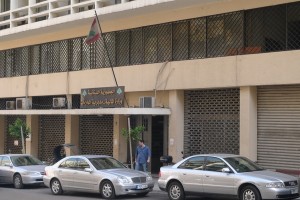A fortnight after we started working, we returned once again to the Finance Ministry hoping to pick up the completed papers confirming our status as self-employed. We’ve become accustomed to the place and its local circuits, as they send us from bureau to bureau, via the café up the hill with a dilapidated inky photocopier (operated with the backup of a spanner) and the tobacconist down the hill who sells official tax stamps. As we pass the various staff members who have bemusedly guided us through the tax regulations, they greet us, Ahlan, welcome. Have you got what you need? How is London?
The stairwell smells of rose water pastries and a tray of plastic coffee cups sits on a ledge with three or four Turkish coffee pots rimmed with tarry sediment. The girls in one office are in stitches over a cockroach which is advancing up the wall.
We wait eagerly at the last port of call for the papers which mean we can bill for the work we have already begun. Behind the desks, the large windows have a direct view into the building on the opposite side of the street. Its façade must have been blown off in the civil war and the rooms are all open like pigeon holes on the street. Someone must be living somewhere in part of it – perhaps the back side is relatively intact – because from a string across one of the gaping concrete boxes hangs a pair of jeans and a jumper drying.
Finally the paper stamps are slapped on, the ink stamps impressed over them and a signature is added to top it off. As we head off down the stairs elated, I peer at the script on mine. “Ism,” I spell out, ‘name’. It is followed by six strings of scrawl. As I decipher them, I realise that the powers that be have rechristened me with a composition of my first and middle name, my father’s full name, plus my maiden and married names. It somehow reminds me of race horse breeding, as in Lightning, by Flyingbolt out of Dazzler.
Yet another reminder of just how important family identity is in Arab culture. Far more vital than individual identity, since when you come to think about it, repeatedly calling children after their fathers, uncles and grandfathers is not very helpful when there is a real need to track down a specific person.
In both Muslim and Christian culture, tradition has it that the first boy in each generation be given the first name of his paternal grandfather, let’s say Ahmed, and as a middle name his father’s first name, say Ali. It follows that if that boy is the first among his siblings to have a son, then he ought to call it after his own father, so Ali, and give the child his own name, Ahmed, as a middle name. The surname, maybe Khalifa, stays the same throughout the paternal line. So in theory these same two names – Ahmed Ali Khalifa and Ali Ahmed Khalifa – will alternate with each generation. In our nuclear European families, we would worry about the dilemma of other family members opening our post, but not here. Besides, in Lebanon nothing important travels by post.
Maybe that is why knowing the intimate details of your neighbours’ personal life is essential here. If you didn’t know exactly what they were doing on what night and with whom, then they might end up in prison for a crime committed by a distant cousin living in the same village.
